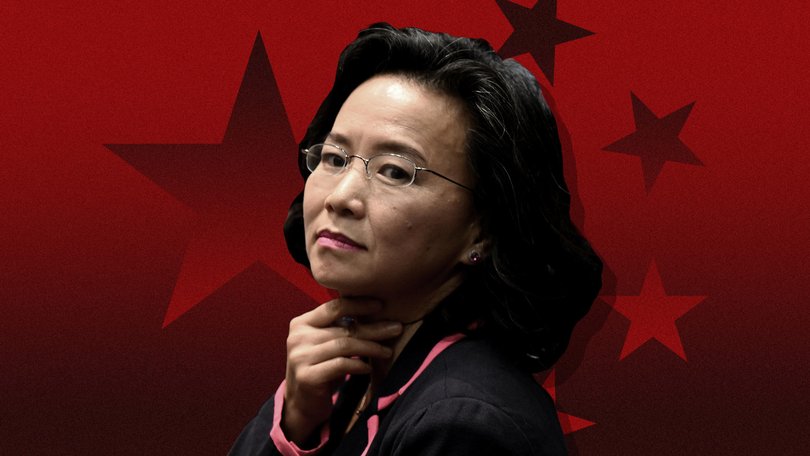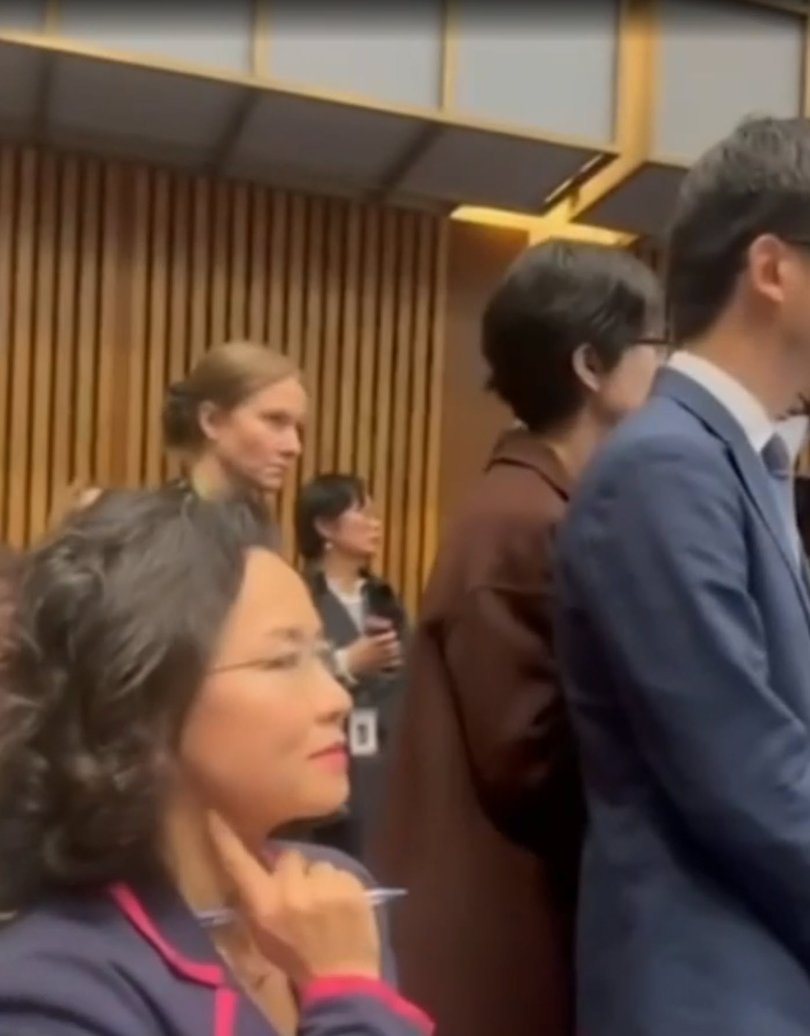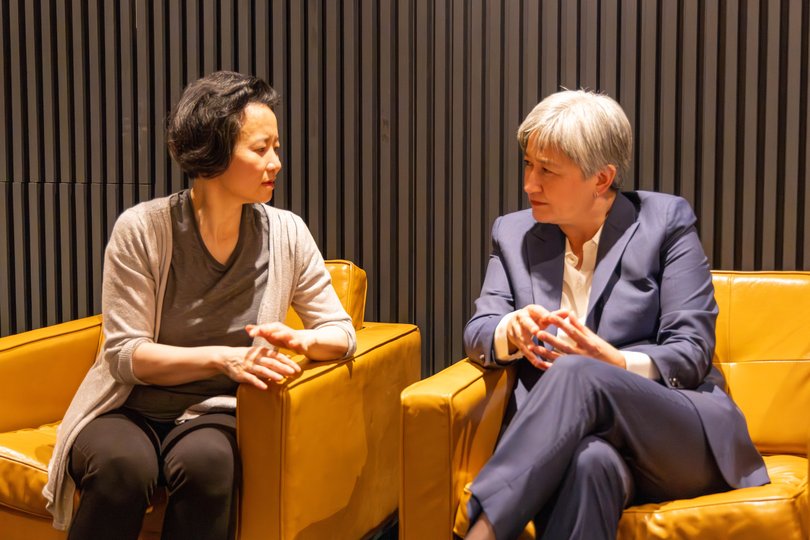‘They keep tabs on me’: Chinese consul-general tried to censor Cheng Lei talk in Melbourne
A top Chinese Communist Party diplomat tried to get a Melbourne appearance by journalist Cheng Lei shut down, and invoked the China-Australia trade relationship in the process.

The Chinese Communist Party’s chief diplomat in Melbourne tried to get a think tank to shut down an appearance by journalist Cheng Lei, and invoked the China-Australia trade relationship in the process.
Chinese-born, Australian journalist Cheng Lei was locked up by the CCP in China for three years and two months. She was detained after the former Coalition government called for an inquiry into COVID and convicted in a sham trial for forwarding a fellow journalist an economic report before its public release.
Speaking exclusively to the Latika Takes podcast in London, where Lei appeared at PEN International’s Day of the Imprisoned Writer, she said the CCP was still trying to silence her, two years after being released from detention in China.
Sign up to The Nightly's newsletters.
Get the first look at the digital newspaper, curated daily stories and breaking headlines delivered to your inbox.
By continuing you agree to our Terms and Privacy Policy.“They keep tabs on me,” Ms Cheng said. “For example, I know they tried to stop a talk that I was giving at the Australian Institute of International Affairs. This is the Melbourne consulate.”
Ms Cheng details her time in jail and the geopolitical storm in which she was caught in her recently released memoir, Cheng Lei: A Memoir of Freedom.
She said that while she remained angry at the time the CCP had deprived her of her freedom and time with her young daughter and son, she was using her unique position of safety in Australia to tell the world about how the Chinese government treats individuals and families.
“It’s a different standard of humanity, and that is something that’s totally missing from a lot of the coverage that we get on China just because a select few go through this and then they’re too scared to write about it afterwards,” she said.
“So I’m definitely using that freedom to their dismay, probably.”
Richard Iron, President of the Australian Institute of International Affairs Victorian branch, confirmed the Chinese had asked him to cancel Cheng Lei’s talk.
He said China’s Consul General Fang Xinwen had visited him in the morning on August 5, the day of Lei’s scheduled talk.
I know that they spread fear in the community, which is very dangerous for our democracy and freedom,
Mr Iron said Fang Xinwen first discussed the benefits of Australia’s trading relationship with China — China is Australia’s largest trading partner — and the desire for friendship between the two countries.
But Mr Iron said after their long discussion ended and they took some photographs, Fang Xinwen told him that he couldn’t help but notice that they had an advertised event with Cheng Lei coming up that night.
Mr Iron said the Consul-General told him that Cheng Lei had “a warped idea about China” and was a “convicted criminal”.
Mr Iron told The Nightly that he told Fang Xinwen in response that Australians wanted a good trading relationship with China and also desired friendship, but that: “They don’t like being spied on, they don’t like being intimidated, and they don’t like being bullied”.
The Consul-General was contacted for comment, but did not respond.
A spokeswoman for the Department of Foreign Affairs and Trade said the intervention was inappropriate.
“Freedom of expression and association are important parts of Australia’s democracy,” the spokeswoman said.
“It would not be appropriate for any foreign government to exert pressure or prevent freedom of expression in Australia,” the spokeswoman said.
“Private organisations are free to make their own decisions and engage with individuals and civil society in a manner consistent with their interests.”
It is the second time that it is known that the Chinese have tried to cancel Cheng Lei from Australian public life.
In June last year, Chinese officials accompanying Chinese Premier Li Qiang on his visit to Canberra to meet Prime Minister Anthony Albanese tried to physically block Ms Cheng from camera view.
Ms Cheng was an anchor for China’s state-run English-language television station CGTN when she was arrested and accused of “illegally supplying state secrets overseas’’.
Since her release, she has returned to journalism, working for Sky News Australia and was attending a document signing ceremony between the Chinese Premier and Australian Prime Minister in that capacity.
The incident made global headlines.

Ms Cheng said she did not expect that reaction from the Chinese officials, but that it was part of the CCP’s ongoing disinformation campaign against her.
“When they did that and caused a diplomatic kerfuffle, it looked really bad overseas, but in China, who was to know?” Ms Cheng said.
“And this is the shelter of the great firewall of China and their disinformation campaigns against me.”
But she said the Australian government also aided the Chinese by trying to withhold the names of the Chinese officials from her.
“So the fear is wide and deep,” she said.
She said that as someone who had been locked up by the CCP, she was “fearless” in contrast to the fear of politicians and business figures who worried about Chinese backlash in response to stronger policies.
She said the government was concerned about provoking another episode of Chinese retribution that involved her being taken as a diplomatic hostage as well as the economic coercion involving China’s trade bans and tariffs on wine, lobster, coal, barley and beef, which former DFAT official Ron Wickes has calculated cost Australia around $31 billion in gross export losses and $20 billion when other trading routes are factored in.
Chinese diaspora not buying into Australia
She said this was both a political and economic issue as politicians also feared the powerful Chinese vote, which is particularly prevalent in suburban metropolitan seats that Labor holds, such as Chisholm in Melbourne and Bennelong in Sydney.
“There’s PTSD about China’s retaliation, and there’s also PTSD on a political calculation side — so, losing the Chinese Australian vote, as it were and that really needs to be dealt with,” she said.
She said there needed to be better data gathered and made available to understand the views of Chinese voting attitudes.
Cheng Lei’s parents moved to Australia when she was aged 10 in the mid-1980s.
But she warned that technology was enabling the Chinese diaspora to live in its own bubble, in a way that was not possible in her parents’ day.
“It needs to be a two-way street of acceptance and integration, between the non-Chinese and the Chinese immigrants,” she said.
“I see the immigrant bubbles, and it’s not just the Chinese community because of technology, because of the number of certain diasporas, there’s less inclination to integrate into what might be called mainstream society that may not have been the case 20, 30 years ago.
“They use Chinese apps, go to Chinese restaurants, go back to China for holidays, and then they don’t really fully experience the benefits of a free society.
“People want the rights of democracy, but they don’t want the responsibilities.”

She said the “China cheerleaders” who only ever discuss the economic opportunities and China’s development had an obligation to present the other side.
“Because I lost so much and because I’ve already been in prison, I’m fearless, but so many people are fearful if they have assets or business relationships or family in China,” she said.
“And I can’t think of another major power that is so obsessed with restricting and controlling the diaspora overseas and has so many resources and uses them compared to other countries.
She added that the CCP’s control of its diaspora was having a corrosive effect on Australian democracy.
“I know that they spread fear in the community, which is very dangerous for our democracy and freedom,” she said.
“Whether it’s the diaspora, whether it’s institutions that depend on China’s revenues, or even our politicians who think that it’s by them voicing criticisms, it’s going to lead to some sort of sway in the electorates.
“I think we’re gradually giving them that power, which I don’t like to see.”

